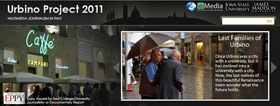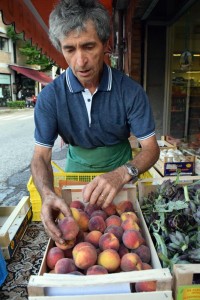The Alimentary Rule of Italian Shopping - Urbino Project 2015

- Julianna Graham
- On June 23, 2015
Small grocers with fresh products survive in Italy.
URBINO, Italy - As a customer walks into the small, two-room grocery on Via Nicollo’ Pellipario asking for fresh peaches, shop owner Luigi Valentini greets her with a smile, steps from behind the register and begins to hand-select the ripest fruit. Meanwhile in the adjoining room, his wife, Iside Mancini, is slicing prosciutto and ciabatta for the panini for a regular’s daily order.
“You need to feel affection for your job, you have to have fun!” Luigi said.
The couple own Frutta E Veroura. It is an alimentary, one of the small, neighborhood grocery stores offering fresh produce and meats that can still be found on the streets of most Italian cities.
As the rest of the world is moving to the impersonal, pre-packaged, bulk shopping at huge discount sellers, the tradition of one-on-one local grocers remains strong in Italy. It seems the alimentary is still valued in a nation with a cultural demand that meals be cooked daily and with the freshest ingredients.
Luigi and Iside have been filling that need in this Urbino neighborhood for 40 years and have no plans to change professions.
“In life you need to have the singular will to do something,” explains Valentini. “Everyone is meant to do one job and you have to enjoy it, and I love this job.”
He begins each morning at 5:30 on their vast farm about 4.5 miles from the two-room store . While most of the city still sleeps, he loads his aging white Ford van with produce grown on their fields. By 7a.m. he’s opening the doors of Frutta E Veroura and Iside has arrived to open the cheese and meat counter for the first of what will be a steady flow of customers begins.
Costumers from all walks of life come in and out of Valentini’s doors in a consistent, rhythmic flow. From young parents going in for a few hand picked veggies to cook with dinner to old friends just stopping in to say hello, each costumer is greeted with a smile and a warm “Buongiorno!” Luigi tries to make every customer feel valued and appreciated.
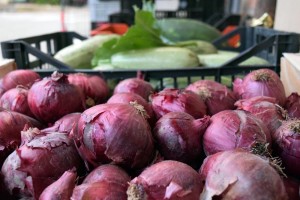
With new fruit and veggies coming in every day, chain stores can’t compete with the freshness of alimentaries.
The only break the couple gets on these busy days are during pausa, the traditional Italian three- to four-hour lunch break. Valentini and Iside head back to their lovely home to relax and eat, although Valentini also likes to use this time to maintain his farm. Once they are refreshed, it’s back to the store by 4 p.m. where work continues until 8 p.m.
Luigi and Iside have managed to keep their business strong even as large chains have moved inside the walls of this famed Renaissance city. Luigi believes the strong personal relationships with his customers and the other alimentary owners help them survive.
“In the past, there used to be around fifty shops” he explained. “When Conad (a major Italian chain) came into town, they asked shops to join them and become investors. Some joined and some did not. We were the stubborn ones!”
Stores like Conad carry a large selection of produce at a much cheaper price than an alimentary, so most of the students in this college town as well as many residents tend to opt for the savings and can be seen carrying Conad shopping bags.
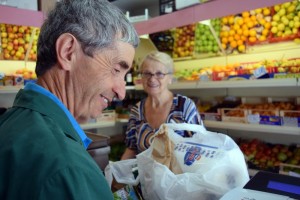
Luigi takes pride in his relationships with his customers, making it one of the many reasons why he loves his job.
Alimentary owners have fought back by forming alliances.
Claudio Polidoro, owner of an alimentary in town, explained. “When I am out of a certain kind of food that a customer wants, I will send them to a different shop that I know will have it,” he said
Luigi and his wife remain confident in the future. Luigi makes it clear that in order to be successful in a business where competition always surrounds you, you must have qualities that make you unique.
“Competition is the ugly beast of commerce and you must fight against it!” Valentini says forcefully. “I have fresh fruits here. It’s not pretty but it is good quality. It is why I’m still here.”
He also says maintaining positive relationships with his costumers have been essential to their success. “Some of our costumers have been shopping here for 38 years!,” he said.
The alimentary lifestyle apparently appeals to some younger Italians as well. Just up the street from Luigi’s shop, Daniela Formica and her partner run La Verde Mela.
“We bought this shop from our neighbors because they have a child and didn’t have the time to keep up with the shop,” explained Daniela. “[Competition] doesn’t scare me because we keep our products fresh.”
Valentini Luigi says their chances for success are good – as long as they provide fresh products and love the life.
“If you like your job, you will overcome the difficulties,” he said. “It is your art.”
Slideshow
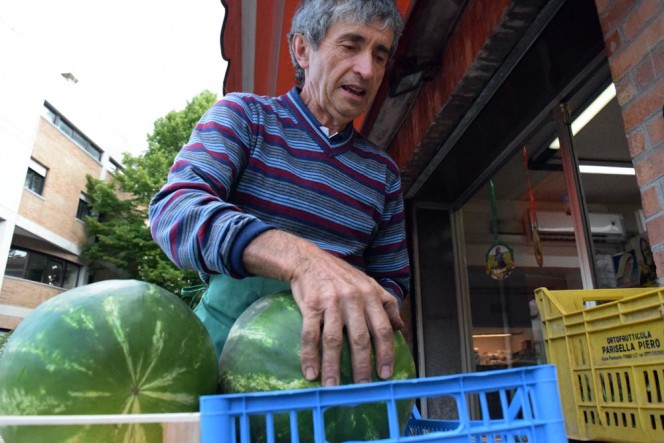
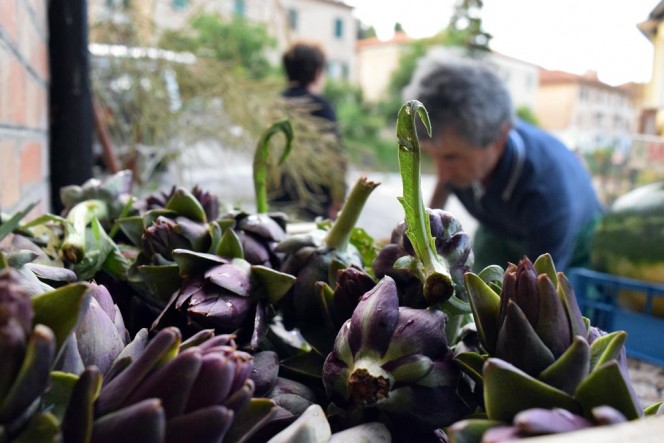
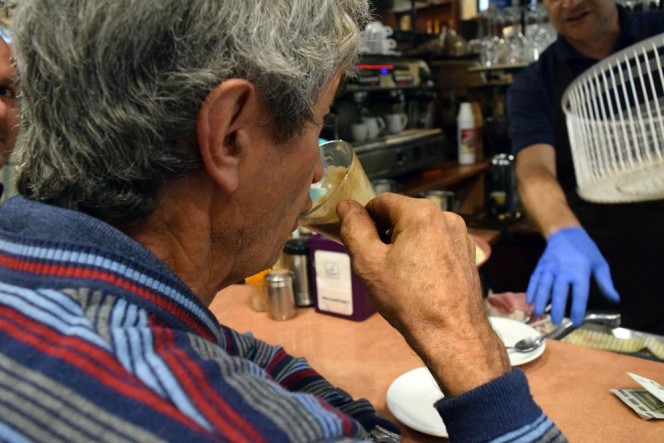
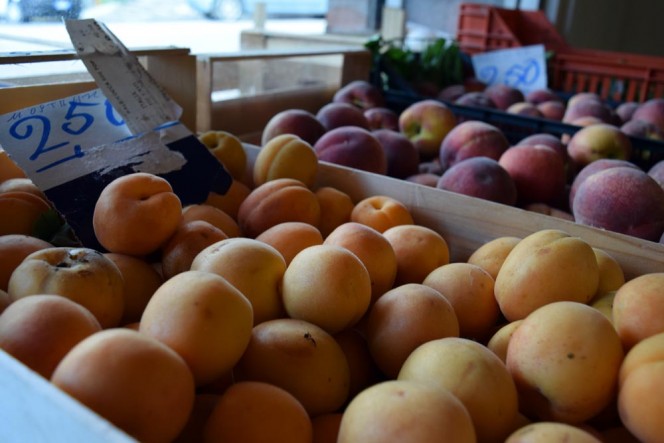
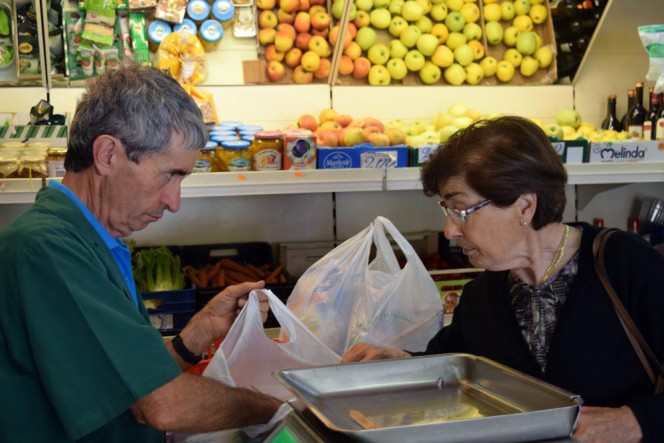
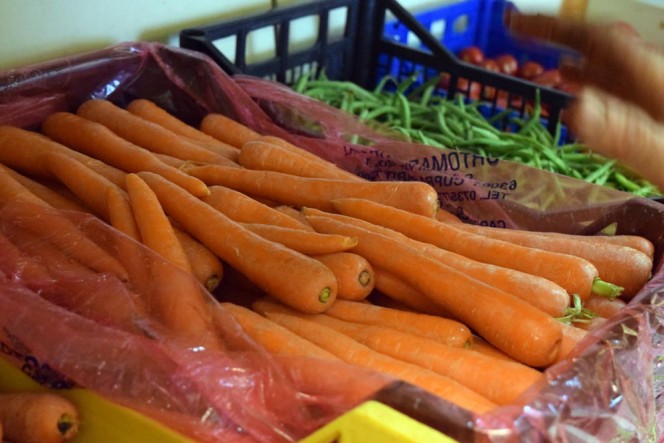
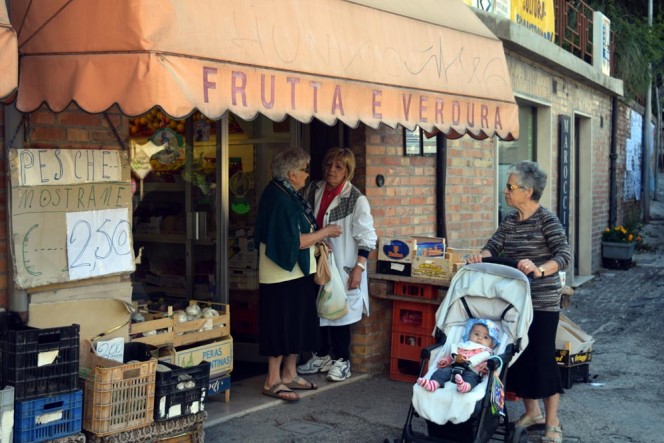
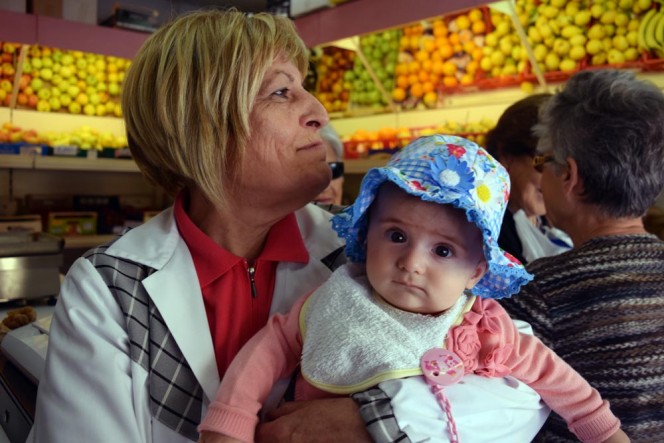
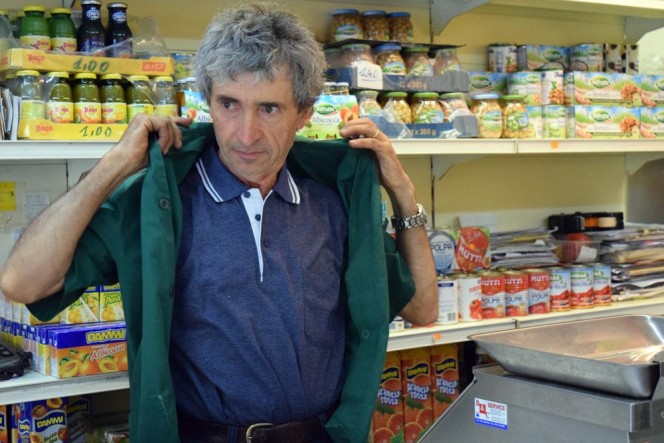
Video (By Rachel Killmeyer & Jules Graham)
Order Urbino Now Magazine 2015
 You can read many articles appearing on this website in Urbino Now Magazine 2015. To order a full-color, printed edition, please visit MagCloud.
You can read many articles appearing on this website in Urbino Now Magazine 2015. To order a full-color, printed edition, please visit MagCloud.Reporters
Courtney Bochicchio
Christina Botticchio
Deanna Brigandi
Alysia Burdi
Anita Chomenko
Isabella Ciano
Rachel Dale
Caroline Davis
Nathaniel Delehoy
Brittany Dierken
Sarah Eames
Thomas Fitzpatrick
Kendall Gilman
Michele Goad
Julianna Graham
Yusuf Ince
Devon Jefferson
Rachel Killmeyer
Kaitlin Kling
Abbie Latterell
Ashley Manske
Rachel Mendelson
Alyssa Mursch
Manuel Orbegozo
Dylan Orth
Olivia Parker
Katie Potter
Gerardo Simonetto
Jake Troy
Stephanie Smith
Tessa Yannone
Ryan Young
Promotional Video Project
Nicole Barattino
Richard Bozek
Rebecca Malzahn
Abigail Moore
Charlie Phillips
Story Categories
Past Urbino Projects
 Read stories and view the photography and video from last year's website.
Read stories and view the photography and video from last year's website.
2013 Website
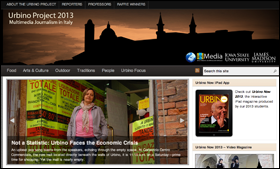 Read stories and view the photography and video from the 2013 website.
Read stories and view the photography and video from the 2013 website.
2013 Urbino Now App
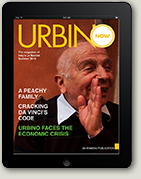 Interactive Apple iPad app covering culture and travel for visitors to Urbino and Le Marche.
Interactive Apple iPad app covering culture and travel for visitors to Urbino and Le Marche.
2012 Website
 Read stories and view the photography and video from the 2012 website.
Read stories and view the photography and video from the 2012 website.
2012 Urbino Now Magazine
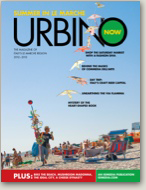 Explore past coverage from the 2012 edition.
Read all 30 magazine articles online or visit MagCloud to order a printed copy of Urbino Now 2012.
Explore past coverage from the 2012 edition.
Read all 30 magazine articles online or visit MagCloud to order a printed copy of Urbino Now 2012.
2011 Website
